英语高频考点
高考英语考纲100个高频考点总结
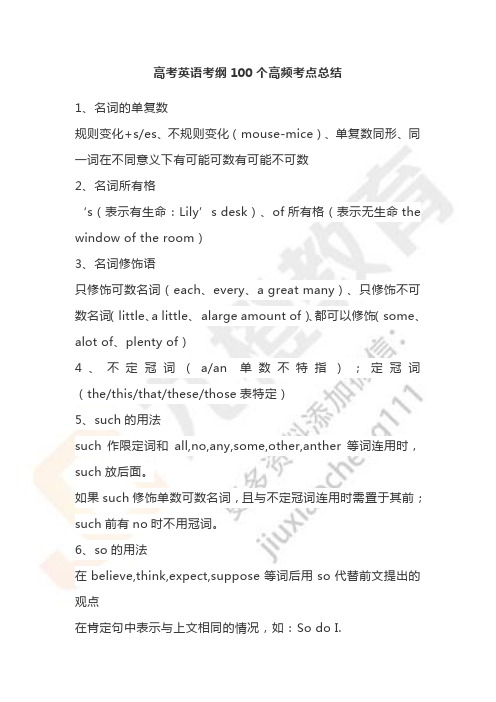
高考英语考纲100个高频考点总结1、名词的单复数规则变化+s/es、不规则变化(mouse-mice)、单复数同形、同一词在不同意义下有可能可数有可能不可数2、名词所有格‘s(表示有生命:Lily’s desk)、of所有格(表示无生命the window of the room)3、名词修饰语只修饰可数名词(each、every、a great many)、只修饰不可数名词(little、a little、alarge amount of)、都可以修饰(some、alot of、plenty of)4、不定冠词(a/an单数不特指);定冠词(the/this/that/these/those表特定)5、such的用法such作限定词和all,no,any,some,other,anther等词连用时,such放后面。
如果such修饰单数可数名词,且与不定冠词连用时需置于其前;such前有no时不用冠词。
6、so的用法在believe,think,expect,suppose等词后用so代替前文提出的观点在肯定句中表示与上文相同的情况,如:So do I.7、all和both的用法all三者或三者以上全部都,both二者都。
all指整体或抽象事物时当做单数,指人时当做复数。
both做主语时,谓语动词用复数。
8、many修饰或替代可数名词,much修饰或替代不可数名词many a 许多(谓语动词用单数)a good/greatmany很多as many as/asmuch as一样多、差不多9、little几乎没有,修饰不可数名词a little有一点,修饰不可数名词few几乎没有,修饰可数名词a few有一点,修饰可数名词耶鲁学姐笑笑说夜幕来领,你却不在身边#英文歌#英语歌曲#情感#英语视频号10、形容词比较级最高级原级比较:…is as good asmine.表示少于或超过另一方:fewer than, morethan易混淆短语:as well as也…既…as far as就…而言11、比较级常见错误:用much表强调时的误用She looks more younger than I.(×)She looks much younger than I.(√)12、介词短语重点except for除了in place of代替on behalf of代表but for要不是in front of在…前面13、介词across, over, through, past四个常考介词的区别across 横穿穿越,发生在物体表面over 跨过越过,发生在物体上方through 穿过,发生在某物空间内past 从旁经过14、易混淆的介词短语in all总共after all毕竟at all根本,常用在否定句中表强调above all最重要的是,尤其是15、序数词前一定要加定冠词the,改错常考,序数词与基数词连用时,序数词放在前面,如the first one。
高考英语100个高频考点,记住!基础再差也能得分!(20页)
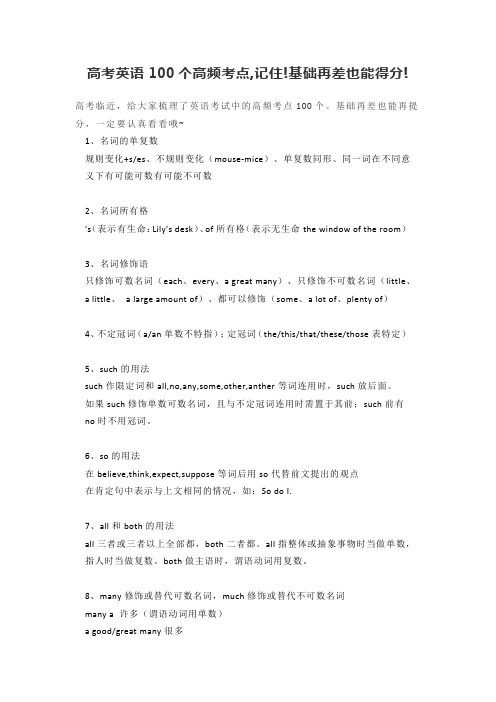
高考英语100个高频考点,记住!基础再差也能得分!高考临近,给大家梳理了英语考试中的高频考点100个。
基础再差也能再提分,一定要认真看看哦~1、名词的单复数规则变化+s/es、不规则变化(mouse-mice)、单复数同形、同一词在不同意义下有可能可数有可能不可数2、名词所有格’s(表示有生命:Lily’s desk)、of所有格(表示无生命the window of the room)3、名词修饰语只修饰可数名词(each、every、a great many)、只修饰不可数名词(little、a little、 a large amount of)、都可以修饰(some、a lot of、plenty of)4、不定冠词(a/an单数不特指);定冠词(the/this/that/these/those表特定)5、such的用法such作限定词和all,no,any,some,other,anther等词连用时,such放后面。
如果such修饰单数可数名词,且与不定冠词连用时需置于其前;such前有no时不用冠词。
6、so的用法在believe,think,expect,suppose等词后用so代替前文提出的观点在肯定句中表示与上文相同的情况,如:So do I.7、all和both的用法all三者或三者以上全部都,both二者都。
all指整体或抽象事物时当做单数,指人时当做复数。
both做主语时,谓语动词用复数。
8、many修饰或替代可数名词,much修饰或替代不可数名词many a 许多(谓语动词用单数)a good/great many很多as many as/as much as一样多、差不多9、little几乎没有,修饰不可数名词a little有一点,修饰不可数名词few几乎没有,修饰可数名词a few有一点,修饰可数名词10、形容词比较级最高级原级比较:…is as good as mine.表示少于或超过另一方:fewer than, mor ethan易混淆短语:as well as也…既…as far as就…而言11、比较级常见错误:用much表强调时的误用She looks more younger than I.(×)She looks much younger than I.(√)12、介词短语重点except for除了in place of代替on behalf of代表but for要不是in front of在…前面13、介词across, over, through, past四个常考介词的区别across 横穿穿越,发生在物体表面over 跨过越过,发生在物体上方through 穿过,发生在某物空间内past 从旁经过14、易混淆的介词短语in all总共after all毕竟at all根本,常用在否定句中表强调above all最重要的是,尤其是15、序数词前一定要加定冠词the,改错常考,序数词与基数词连用时,序数词放在前面,如the first one。
高中英语考试中的高频考点100个

英语考试中的高频考点100个1.名词的单复数规则变化+s/es、不规则变化(mouse-mice)、单复数同形、同一词在不同意义下有可能可数有可能不可数2.名词所有格’s(表示有生命:Lily’s desk)、of所有格(表示无生命the window of the room)3.名词修饰语只修饰可数名词(each、every、a great many)、只修饰不可数名词(little、a little、alarge amount of)、都可以修饰(some、alot of、plenty of)4.不定冠词(a/an单数不特指);定冠词(the/this/that/these/those表特定)5.such的用法such作限定词和all,no,any,some,other,anther等词连用时,such放后面。
如果such修饰单数可数名词,且与不定冠词连用时需置于其前;such前有no时不用冠词。
6.so的用法在believe,think,expect,suppose等词后用so代替前文提出的观点在肯定句中表示与上文相同的情况,如:So do I.7.all和both的用法all三者或三者以上全部都,both二者都。
all指整体或抽象事物时当做单数,指人时当做复数。
both做主语时,谓语动词用复数。
8.many修饰或替代可数名词,much修饰或替代不可数名词many a 许多(谓语动词用单数)a good/greatmany很多as many as/asmuch as一样多、差不多9.little几乎没有,修饰不可数名词a little有一点,修饰不可数名词few几乎没有,修饰可数名词a few有一点,修饰可数名词10.形容词比较级最高级原级比较:…is as good asmine.表示少于或超过另一方:fewer than, morethan易混淆短语:as well as也…既…as far as就…而言11.比较级常见错误:用much表强调时的误用She looks moreyounger than I.(×)She looks muchyounger than I.(√)12.介词短语重点except for除了in place of代替on behalf of代表but for要不是in front of在…前面13.介词across,over,through,past四个常考介词的区别across横穿穿越,发生在物体表面over跨过越过,发生在物体上方through穿过,发生在某物空间内past从旁经过14.易混淆的介词短语in all总共after all毕竟at all根本,常用在否定句中表强调above all最重要的是,尤其是15.序数词前一定要加定冠词the,改错常考,序数词与基数词连用时,序数词放在前面,如the first one。
英语高考介词高频考点
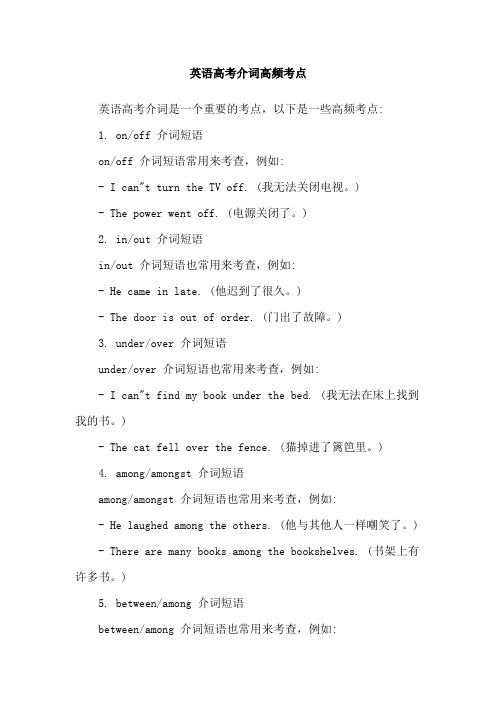
英语高考介词高频考点英语高考介词是一个重要的考点,以下是一些高频考点:1. on/off 介词短语on/off 介词短语常用来考查,例如:- I can"t turn the TV off. (我无法关闭电视。
)- The power went off. (电源关闭了。
)2. in/out 介词短语in/out 介词短语也常用来考查,例如:- He came in late. (他迟到了很久。
)- The door is out of order. (门出了故障。
)3. under/over 介词短语under/over 介词短语也常用来考查,例如:- I can"t find my book under the bed. (我无法在床上找到我的书。
)- The cat fell over the fence. (猫掉进了篱笆里。
)4. among/amongst 介词短语among/amongst 介词短语也常用来考查,例如:- He laughed among the others. (他与其他人一样嘲笑了。
) - There are many books among the bookshelves. (书架上有许多书。
)5. between/among 介词短语between/among 介词短语也常用来考查,例如:- I can"t find my keys between the sofa and the wall. (我无法在沙发和墙上找到我的钥匙。
)- The children played happily among the flowers. (孩子们在花丛中玩得很开心。
)这些介词短语在英语高考中常常会出现,考生需要熟练掌握它们的含义和用法,以便在考试中更好地应对。
英语中考高频考点归纳

英语中考高频考点归纳1.冠词a/an/the ①泛指用a或an,特指用the;②在a、e、i、o、u开头的单词前大多数用an;__eleven—year—old boy ③___ (useful,usual, university,unit,European,UFO)..。
___one-year—old boy ____(umbrella, uncle,unusual)____hour ____honest boy ____dishonest boy ④play+球类运动/chess/cards;play +____ +乐器⑤_____ MP5 单个字母前用an的有12个:Mr。
Li has one fox。
李先生有一个狐狸.【例】—Who is ____ girl behind the tree? ——Which one?The one with ____umbrella。
2.感叹句以叹号结尾,先划主语,再划谓语后;有名词用What,没名词用HowWhat +a/an+adj。
+单数名词+主语+谓语。
.!What +adj。
+不可数名词或复数名词+主语+谓语。
.。
!How +adj。
/adv。
+主语+谓语.。
!注:感叹句中常见的不可数名词有news,advice,information,weather,fun【例】___________ friendly the girl is!3.主句用一般将来时/情态动词/祈使句,从句用一般现在时(主将从现的有):if/as soon as/when/unless/until/before+一般现在时【例】—Frank, could we paint the room together tomorrow?—No,if I ____free tomorrow。
A。
be B。
am C. will be D. was 4.名词或代词+定语从句: 先行词是人时可用______/______;先行词是物时可用______/______,有that优先用.作主语不可省略,作宾语可省。
中考英语高频考点词组

中考英语中的高频考点词组包括但不限于以下内容:
1. 动词短语:
- look forward to 期待
- carry out 实施
- give up 放弃
- come up with 提出
- put off 推迟
- take part in 参加
2. 形容词短语:
- be fond of 喜爱
- be interested in 对...感兴趣
- be good at 擅长
- be worried about 担心
3. 名词短语:
- a piece of 一片,一件
- a lot of 许多
- a number of 许多
- the number of ...的数量
- the way to ...的方法
- the reason why ...的原因
4. 副词短语:
- as soon as 一...就...
- at first 起初
- in the end 最后
- on purpose 故意地
- by accident 偶然地
5. 介词短语:
- in front of 在...前面
- on the way to 在去...的路上
- at the end of 在...的末尾
- in the middle of 在...中间
- on the other hand 另一方面
这些词组在中考英语中经常出现,并且对于理解阅读材料、写作和口语表达都具有重要作用。
熟练掌握这些高频考点词组将有助于提高英语应试能力。
初中英语被动语态高频考点
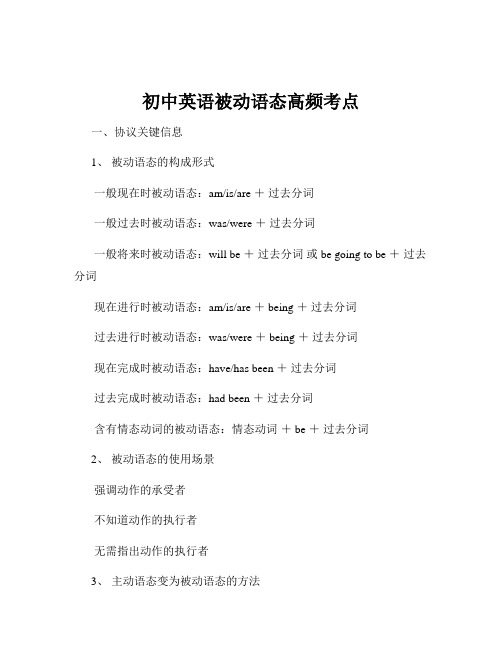
初中英语被动语态高频考点一、协议关键信息1、被动语态的构成形式一般现在时被动语态:am/is/are +过去分词一般过去时被动语态:was/were +过去分词一般将来时被动语态:will be +过去分词或 be going to be +过去分词现在进行时被动语态:am/is/are + being +过去分词过去进行时被动语态:was/were + being +过去分词现在完成时被动语态:have/has been +过去分词过去完成时被动语态:had been +过去分词含有情态动词的被动语态:情态动词+ be +过去分词2、被动语态的使用场景强调动作的承受者不知道动作的执行者无需指出动作的执行者3、主动语态变为被动语态的方法把主动语态的宾语变为被动语态的主语把主动语态的谓语动词变为“be +过去分词”形式把主动语态的主语变为 by 短语(如果需要)4、注意事项不及物动词没有被动语态某些系动词(如 look, sound, smell 等)用主动形式表示被动意义一些动词短语在变为被动语态时,动词短语中的介词或副词不能省略二、协议具体内容11 被动语态的构成形式111 一般现在时被动语态在一般现在时中,当主语是动作的承受者时,使用“am/is/are +过去分词”的形式构成被动语态。
例如:“The classroom is cleaned every day”(教室每天都被打扫。
)112 一般过去时被动语态一般过去时的被动语态由“was/were +过去分词”构成。
比如:“The window was broken yesterday”(窗户昨天被打破了。
)113 一般将来时被动语态一般将来时的被动语态有两种构成形式,“will be +过去分词”和“be going to be +过去分词”。
像:“The sports meeting will be held next week”(运动会将在下周举行。
高考英语高频考点100个
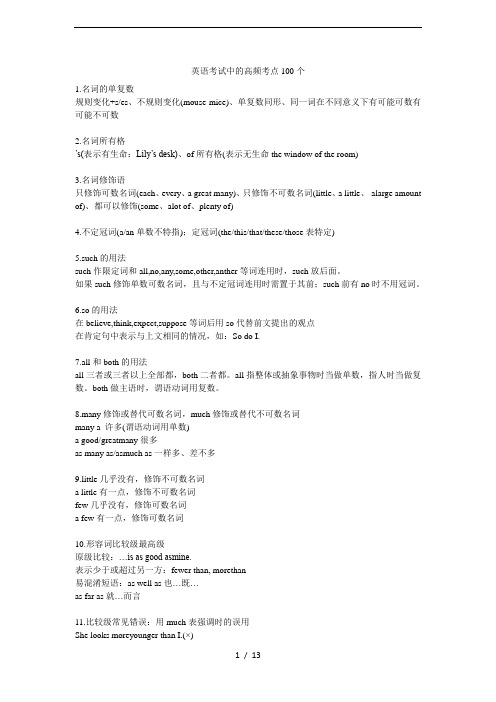
英语考试中的高频考点100个1.名词的单复数规则变化+s/es、不规则变化(mouse-mice)、单复数同形、同一词在不同意义下有可能可数有可能不可数2.名词所有格’s(表示有生命:Lily’s desk)、of所有格(表示无生命the window of the room)3.名词修饰语只修饰可数名词(each、every、a great many)、只修饰不可数名词(little、a little、alarge amount of)、都可以修饰(some、alot of、plenty of)4.不定冠词(a/an单数不特指);定冠词(the/this/that/these/those表特定)5.such的用法such作限定词和all,no,any,some,other,anther等词连用时,such放后面。
如果such修饰单数可数名词,且与不定冠词连用时需置于其前;such前有no时不用冠词。
6.so的用法在believe,think,expect,suppose等词后用so代替前文提出的观点在肯定句中表示与上文相同的情况,如:So do I.7.all和both的用法all三者或三者以上全部都,both二者都。
all指整体或抽象事物时当做单数,指人时当做复数。
both做主语时,谓语动词用复数。
8.many修饰或替代可数名词,much修饰或替代不可数名词many a 许多(谓语动词用单数)a good/greatmany很多as many as/asmuch as一样多、差不多9.little几乎没有,修饰不可数名词a little有一点,修饰不可数名词few几乎没有,修饰可数名词a few有一点,修饰可数名词10.形容词比较级最高级原级比较:…is as good asmine.表示少于或超过另一方:fewer than, morethan易混淆短语:as well as也…既…as far as就…而言11.比较级常见错误:用much表强调时的误用She looks moreyounger than I.(×)She looks muchyounger than I.(√)12.介词短语重点except for除了in place of代替on behalf of代表but for要不是in front of在…前面13.介词across,over,through,past四个常考介词的区别across横穿穿越,发生在物体表面over跨过越过,发生在物体上方through穿过,发生在某物空间内past从旁经过14.易混淆的介词短语in all总共after all毕竟at all根本,常用在否定句中表强调above all最重要的是,尤其是15.序数词前一定要加定冠词the,改错常考,序数词与基数词连用时,序数词放在前面,如the first one。
高中英语考试中的高频考点100个
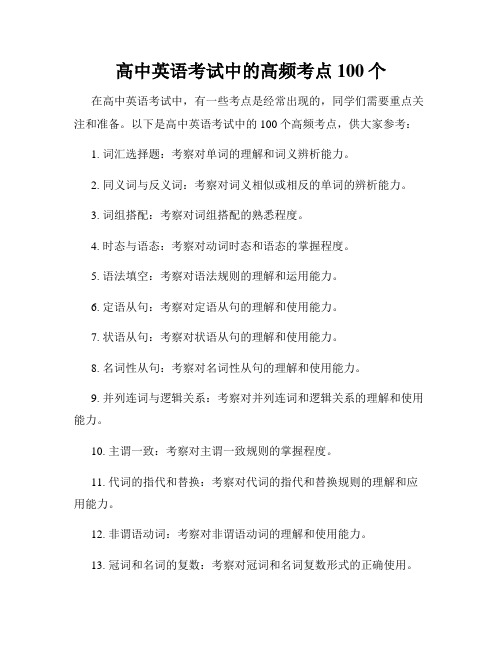
高中英语考试中的高频考点100个在高中英语考试中,有一些考点是经常出现的,同学们需要重点关注和准备。
以下是高中英语考试中的100个高频考点,供大家参考:1. 词汇选择题:考察对单词的理解和词义辨析能力。
2. 同义词与反义词:考察对词义相似或相反的单词的辨析能力。
3. 词组搭配:考察对词组搭配的熟悉程度。
4. 时态与语态:考察对动词时态和语态的掌握程度。
5. 语法填空:考察对语法规则的理解和运用能力。
6. 定语从句:考察对定语从句的理解和使用能力。
7. 状语从句:考察对状语从句的理解和使用能力。
8. 名词性从句:考察对名词性从句的理解和使用能力。
9. 并列连词与逻辑关系:考察对并列连词和逻辑关系的理解和使用能力。
10. 主谓一致:考察对主谓一致规则的掌握程度。
11. 代词的指代和替换:考察对代词的指代和替换规则的理解和应用能力。
12. 非谓语动词:考察对非谓语动词的理解和使用能力。
13. 冠词和名词的复数:考察对冠词和名词复数形式的正确使用。
14. 动词的时态和语态:考察对动词时态和语态的正确运用能力。
15. 形容词和副词的比较级和最高级:考察对形容词和副词比较级和最高级形式的正确使用。
16. 物主代词和反身代词:考察对物主代词和反身代词的正确使用。
17. 动词的不定式和动名词:考察对动词不定式和动词的正确使用。
18. 平行结构:考察对平行结构的理解和运用能力。
19. 固定搭配:考察对固定搭配的熟悉程度。
20. 情态动词和虚拟语气:考察对情态动词和虚拟语气的正确使用。
21. 名词的所有格:考察对名词所有格的正确使用。
22. 倒装句:考察对倒装句的理解和使用能力。
23. 宾语从句:考察对宾语从句的理解和使用能力。
24. 动词短语和介词短语:考察对动词短语和介词短语的理解和使用能力。
25. 含有从句的复合句:考察对含有从句的复合句结构的理解和使用能力。
26. 非限制性定语从句和强调句:考察对非限制性定语从句和强调句的理解和使用能力。
高考英语必备高频考点PDF.pdf

1.接不定式(而不接动名词)作宾语的24个常用动词afford to do sth. 负担得起做某事agree to do sth. 同意做某事arrange to do sth.安排做某事ask to do sth. 要求做某事beg to do sth. 请求做某事care to do sth. 想要做某事choose to do sth. 决定做某事decide to do sth. 决定做某事demand to do sth. 要求做某事determine to do sth. 决心做某事expect to do sth. 期待做某事fear to do sth. 害怕做某事help to do sth. 帮助做某事hope to do sth. 希望做某事learn to do sth. 学习做某事manage to do sth. 设法做某事offer to do sth. 主动提出做某事plan to do sth. 计划做某事prepare to do sth. 准备做某事pretend to do sth. 假装做某事promise to do sth. 答应做某事refuse to do sth. 拒绝做某事want to do sth. 想要做某事wish to do sth. 希望做某事注:有些不及物动词后习惯上也接不定式,不接动名词:aim to do sth. 打算做某事fail to do sth. 未能做某事long to do sth. 渴望做某事happen to do sth. 碰巧做某事hesitate to do sth. 犹豫做某事struggle to do sth. 努力做某事2.接不定式作宾补的36个常用动词advise sb. to do sth. 建议某人做某事allow sb. to do sth. 允许某人做某事ask sb. to do sth.请(叫)某人做某事bear sb. to do sth.忍受某人做某事beg sb. to do sth. 请求某人做某事cause sb. to do sth. 导致某人做某事command sb. to do sth. 命令某人做某事drive sb. to do sth. 驱使某人做某事elect sb. to do sth. 选举某人做某事encourage sb. to do sth. 鼓励某人做某事expect sb. to do sth. 期望某人做某事force sb. to do sth. 强迫某人做某事get sb. to do sth. 使(要)某人做某事hate sb. to do sth. 讨厌某人做某事help sb. to do sth. 帮助某人做某事intend sb. to do sth. 打算要某人做某事invite sb. to do sth. 邀请某人做某事leave sb. to do sth. 留下某人做某事like sb. to do sth. 喜欢某人做某事mean sb. to do sth. 打算要某人做某事need sb. to do sth. 需要某人做某事oblige sb. to do sth. 迫使某人做某事order sb. to do sth. 命令某人做某事permit sb. to do sth. 允许某人做某事persuade sb. to do sth. 说服某人做某事prefer sb. to do sth. 宁愿某人做某事request sb. to do sth. 要求某人做某事remind sb. to do sth. 提醒某人做某事teach sb. to do sth. 教某人做某事tell sb. to do sth. 告诉某人做某事train sb. to do sth. 训练某人做某事trouble sb. to do sth. 麻烦某人做某事warn sb. to do sth. 警告某人做某事wish sb. to do sth. 希望某人做某事注意:不要受汉语意思的影响而误用以下动词句型:汉语说:“害怕某人做某事”,但英语不说fear sb. to do sth.。
高考英语学科高频考点单选题30题
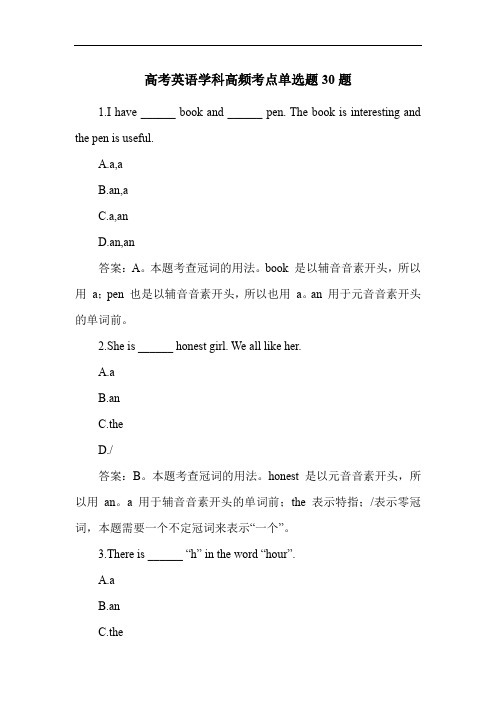
高考英语学科高频考点单选题30题1.I have ______ book and ______ pen. The book is interesting and the pen is useful.A.a,aB.an,aC.a,anD.an,an答案:A。
本题考查冠词的用法。
book 是以辅音音素开头,所以用a;pen 也是以辅音音素开头,所以也用a。
an 用于元音音素开头的单词前。
2.She is ______ honest girl. We all like her.A.aB.anC.theD./答案:B。
本题考查冠词的用法。
honest 是以元音音素开头,所以用an。
a 用于辅音音素开头的单词前;the 表示特指;/表示零冠词,本题需要一个不定冠词来表示“一个”。
3.There is ______ “h” in the word “hour”.A.aB.anC.theD./答案:B。
本题考查冠词的用法。
“h”虽然是辅音字母,但是它的发音是/eɪtʃ/,是以元音音素开头,所以用an。
a 用于辅音音素开头的单词前;the 表示特指;/表示零冠词,本题需要一个不定冠词来表示“一个”。
4.I like playing ______ basketball. He likes playing ______ piano.A.the,theB./,theC.the,/D./,/答案:B。
本题考查冠词的用法。
play basketball 是固定搭配,中间不加冠词;play the piano 也是固定搭配,乐器前面要加the。
5.We have three meals ______ day.A.aB.anC.theD./答案:A。
本题考查冠词的用法。
a day 表示“一天”,是固定用法。
an 用于元音音素开头的单词前;the 表示特指;/表示零冠词,本题需要一个不定冠词来表示“一个”。
6. She is ______ beautiful girl.A. a extremelyB. an extremelyC. extremely aD. extremely an答案:B。
高考英语必备高频考点整理

1.接不定式而不接动名词作宾语的24个常用动词afford to do sth. 负担得起做某事agree to do sth. 同意做某事arrange to do sth.安排做某事ask to do sth. 要求做某事beg to do sth. 请求做某事care to do sth. 想要做某事choose to do sth. 决定做某事decide to do sth. 决定做某事demand to do sth. 要求做某事determine to do sth. 决心做某事expect to do sth. 期待做某事fear to do sth. 害怕做某事help to do sth. 帮助做某事hope to do sth. 希望做某事learn to do sth. 学习做某事manage to do sth. 设法做某事offer to do sth. 主动提出做某事plan to do sth. 计划做某事prepare to do sth. 准备做某事pretend to do sth. 假装做某事promise to do sth. 答应做某事refuse to do sth. 拒绝做某事want to do sth. 想要做某事wish to do sth. 希望做某事注:有些不及物动词后习惯上也接不定式,不接动名词:aim to do sth. 打算做某事fail to do sth. 未能做某事long to do sth. 渴望做某事happen to do sth. 碰巧做某事hesitate to do sth. 犹豫做某事struggle to do sth. 努力做某事2.接不定式作宾补的36个常用动词advise sb. to do sth. 建议某人做某事allow sb. to do sth. 允许某人做某事ask sb. to do sth.请叫某人做某事bear sb. to do sth.忍受某人做某事beg sb. to do sth. 请求某人做某事cause sb. to do sth. 导致某人做某事command sb. to do sth. 命令某人做某事drive sb. to do sth. 驱使某人做某事elect sb. to do sth. 选举某人做某事encourage sb. to do sth. 鼓励某人做某事expect sb. to do sth. 期望某人做某事force sb. to do sth. 强迫某人做某事get sb. to do sth. 使要某人做某事hate sb. to do sth. 讨厌某人做某事help sb. to do sth. 帮助某人做某事intend sb. to do sth. 打算要某人做某事invite sb. to do sth. 邀请某人做某事leave sb. to do sth. 留下某人做某事like sb. to do sth. 喜欢某人做某事mean sb. to do sth. 打算要某人做某事need sb. to do sth. 需要某人做某事oblige sb. to do sth. 迫使某人做某事order sb. to do sth. 命令某人做某事permit sb. to do sth. 允许某人做某事persuade sb. to do sth. 说服某人做某事prefer sb. to do sth. 宁愿某人做某事request sb. to do sth. 要求某人做某事remind sb. to do sth. 提醒某人做某事teach sb. to do sth. 教某人做某事tell sb. to do sth. 告诉某人做某事train sb. to do sth. 训练某人做某事trouble sb. to do sth. 麻烦某人做某事warn sb. to do sth. 警告某人做某事wish sb. to do sth. 希望某人做某事注意:不要受汉语意思的影响而误用以下动词句型:汉语说:“害怕某人做某事”,但英语不说fear sb. to do sth.;汉语说:“原谅某人做某事”,但英语不说excuse forgive sb. to do sth.;汉语说:“拒绝某人做某事”,但英语不说refuse sb. to do sth.;汉语说:“惩罚某人做某事”,但英语不说punish sb. to do sth.;汉语说:“建议某人做某事”,但英语不说suggest propose sb. to do sth.;汉语说:“赞成某人做某事”,但英语不说approve sb. to do sth.;汉语说:“通知某人做某事”,但英语不说inform sb. to do sth.;汉语说:“欢迎某人做某事”,但英语不说welcome sb. to do sth.;汉语说:“坚持某人做某事”,但英语不说insist persist sb. to do sth.; 汉语说:“希望某人做某事”,但英语不说hope sb. to do sth.;汉语说:“安排某人做某事”,但英语不说arrange sb. to do sth.;汉语说:“要求某人做某事”,但英语不说demand sb. to do sth.;汉语说:“感谢某人做某事”,但英语不说thank sb. to do sth.;汉语说:“祝贺某人做某事”,但英语不说congratulate sb. to do sth.; 汉语说:“阻止某人做某事”,但英语不说prevent sb. to do sth.;要表示以上意思,可换用其他表达:汉语的“原谅某人做某事”,英语可说成excuse forgive sb. for doing sth.;汉语的“希望某人做某事”,英语可说成wish sb. to do sth.;汉语的“建议某人做某事”,英语可说成advise sb. to do sth.;汉语的“安排某人做某事”,英语可说成arrange for sb. to do sth.; 汉语的“要求某人做某事”,英语可说成demand of sb. to do sth.; 汉语的“感谢某人做某事”,英语可说成thank sb. for doing sth.;汉语的“祝贺某人做某事”,英语可说成congratulate sb. on sth.;汉语的“阻止某人做某事”,英语可说成prevent sb. from doing sth.;3.接动名词不接不定式作宾语的34个常用动词admit doing sth. 承认做某事advise doing sth. 建议做某事allow doing sth. 允许做某事appreciate doing sth. 感激做某事avoid doing sth. 避免做某事consider doing sth. 考虑做某事delay doing sth. 推迟做某事deny doing sth. 否认做某事discuss doing sth. 讨论做某事dislike doing sth. 不喜欢做某事enjoy doing sth. 喜爱做某事escape doing sth. 逃脱做某事excuse doing sth. 原谅做某事fancy doing sth. 想要做某事finish doing sth. 完成做某事forbid doing sth. 禁止做某事forgive doing sth. 原谅做某事give up doing sth. 放弃做某事imagine doing sth. 想象做某事keep doing sth. 保持做某事mention doing sth. 提及做某事mind doing sth. 介意做某事miss doing sth. 错过做某事pardon doing sth. 原谅做某事permit doing sth. 允许做某事practice doing sth. 练习做某事prevent doing sth. 阻止做某事prohibit doing sth. 禁止做某事put off doing sth. 推迟做某事report doing sth. 报告做某事risk doing sth. 冒险做某事stop doing sth. 停止做某事suggest doing sth. 建议做某事understand doing sth. 理解做某事4.接现在分词作宾补的20个常用动词bring sb. doing sth.引起某人做某事catch sb. doing sth. 碰上撞上某人做某事discover sb. doing sth. 发现某人做某事feel sb. doing sth. 感觉某人做某事find sb. doing sth. 碰上撞上某人做某事get sb. doing sth. 使某人做某事have sb. doing sth. 使某人做某事hear sb. doing sth. 听见某人做某事keep sb. doing sth. 使某人不停地做某事listen to sb. doing sth. 听某人做某事look at sb. doing sth. 看着某人做某事notice sb. doing sth. 注意到某人做某事observe sb. doing sth. 观察某人做某事prevent sb. doing sth. 阻止某人做某事see sb. doing sth. 看见某人做某事send sb. doing sth.使某人突然做某事set sb. doing sth. 使引起某人做某事start sb. doing sth. 使某人开始做某事stop sb. doing sth. 阻止某人做某事watch sb. doing sth. 观察某人做某事5.接动词原形作宾补的11个常用动词feel sb. do sth. 感觉某人做某事have sb. do sth. 使某人做某事hear sb. do sth. 听见某人做某事let sb. do sth.让某人做某事listen to sb. do sth. 听着某人做某事look at sb. do sth. 看着某人做某事make sb. do sth. 使某人做某事notice sb. do sth. 注意某人做某事observe sb. do sth. 观察某人做某事see sb. do sth. 看见某人做某事watch sb. do sth. 观察某人做某事6.接不定式或动名词作宾语意思相同的12个动词like to do sth / like doing sth. 喜欢做某事love to do sth / love doing sth. 喜欢做某事hate to do sth / hate doing sth. 憎恨做某事prefer to do sth / prefer doing sth. 宁可做某事begin to do sth / begin doing sth. 开始做某事start to do sth / start doing sth. 开始做某事continue to do sth / continue doing sth. 继续做某事can’t bear to do sth / can’t bear doing sth. 不能忍受做某事bother to do sth / bother doing sth. 麻烦做某事intend to do sth / intend doing sth.想要做某事attempt to do sth / attempt doing sth. 试图做某事cease to do sth / cease doing sth. 停止做某事7.接不定式或动名词作宾语意思不同的7个动词1 remember to do sth. 记住要做某事remember doing sth. 记住曾做过某事2 forget to do sth. 忘记要做某事forget doing sth. 忘记曾做过某事3 regret to do sth. 后悔遗憾要做某事regret doing sth. 后悔遗憾曾做过某事4 try to do sth. 设法要做某事try doing sth. 做某事试试看有何效果5 mean to do sth. 打算做某事mean doing sth. 意味着做某事6 can’t help to do sth. 不能帮助做某事can’t help doing sth. 禁不住做某事7 go on to do sth. 做完某事后接着做另一事go on doing sth. 继续做一直在做的事注意:stop to do sth. 与stop doing sth.也不同,前者指停下来去做某事,后者指停止正在做的事,但stop to do sth. 中的不定式不是宾语,是目的状语;8.可接双宾语的38个常用动词1 双宾语易位时需借助介词to的常用动词award sb. sth. = award sth. to sb. 颁奖给某人bring sb. sth. = bring sth. to sb. 把某物带给某人hand sb. sth. =hand sth. to sb. 把某物递给某人lend sb. sth. = lend sth. to sb. 把某物借给某人mail sb. sth. = mail sth. to sb. 把某物寄给某人offer sb. sth. = offer sth. to sb. 将某物给某人owe sb. sth. = owe sth. to sb. 把……归功于某人;欠某人某物pass sb. sth. = pass sth. to sb. 把某物递给某人pay sb. sth. = pay sth. to sb. 付给某人某物钱post sb. sth. = post sth. to sb. 把某物寄给某人read sb. sth. = read sth. to sb. 把某物读给某人听return sb. sth. = return sth. to sb. 把某物还给某人send sb. sth. = send sth. to sb. 把某物送给某人sell sb. sth. = sell sth. to sb. 把某物卖给某人serve sb. sth. = serve sth. to sb. 拿某物招待某人show sb. sth. = show sth. to sb. 拿某物给某人看take sb. sth. = take sth. to sb. 把某物拿给某人teach sb. sth. = teach sth. to sb. 教某人某物tell sb. sth. = tell sth. to sb. 告诉某人某情况throw sb. sth. = throw sth. to sb. 把某物扔给某人write sb. sth. = write sth. to sb. 给某人写信2 双宾语易位时需借助介词for的常用动词book sb. sth. = book sth. for sb. 为某人预定某物buy sb. sth. = buy sth. for sb. 为某人买某物choose sb. sth. = choose sth. for sb. 为某人选某物cook sb. sth. = cook sth. for sb. 为某人煮某物draw sb. sth. = draw sth. for sb. 为某人画某物fetch sb. sth. = fetch sth. for sb. 为某人去取某物find sb. sth. = find sth. for sb. 为某人找到某物fix sb. sth. = fix sth. for sb. 为某人准备某物get sb. sth. = get sth. for sb. 为某人拿来某物make sb. sth. = make sth. for sb. 为某人做某物order sb. sth. = order sth. for sb. 为某人订购某物pick sb. sth. = pick sth. for sb. 为某人采摘某物prepare sb. sth. = prepare sth. for sb. 为某人准备某物save sb. sth. = save sth. for sb. 为某人留某物sing sb. sth. = sing sth. for sb. 为某人唱某物歌spare sb. sth. = spare sth. for sb. 为某人让出某物steal sb. sth. = steal sth. for sb. 为某人偷某物注意:有的动词后接的双宾语易位时,既可用介词to引出间接宾语,也可用介词for引出间接宾语,含义相同,如bring,play等:Bring me today’s paper. = Bring today’s paper to for me. 把今天的报纸拿给我;He played us the record he had just bought. = He played the record he had just bought for to us. 他放了他刚买的唱片给我们听;有的动词后接的双宾语易位时,既可用介词to引出间接宾语,也可用介词for引出间接宾语,含义不同,如leave等:They left me no food. = They left no food for me. 他们没给我留一点食物;My uncle left me a large fortune. = My uncle left a large fortune to me.我叔叔死后留下一大笔财产给我;而有的动词后接双宾语时,既不能用介词to引出间接宾语,也不能用介词for引出间接宾语,如allow, ask, cause, charge, cost, forgive, refuse等:He allows his son too much money. 他给他儿子的钱太多;He asked me some questions. 他问了我一些问题;This caused me much trouble. 这给我带来了许多麻烦;He charged me five dollars for a cup of tea. 他一杯茶向我要了5美元;His mistake cost him his job. 他的错误让他丢了工作;I envy you your good luck. 我羡慕你的好运;They forgave him his rudeness. 他们原谅了他的鲁莽;He refused her nothing. 她要什么他就给什么;9.可用于“动词+sb+of sth”的8个常见动词accuse sb. of sth. 控告某人犯某事罪,指责某人做某事cheat sb. of sth. 骗取某人某物cure sb. of sth. 治好某人的病,改掉某人的坏习惯inform sb. of sth. 通知某人某情况事remind sb. of sth. 使某人想起某情况事rid sb. of sth. 使某人摆脱某物rob sb. of sth. 抢劫某人的某东西warn sb. of sth. 警告某人有某情况10.可用于“动词+sb+for doing sth”的8个常见动词blame sb. for doing sth. 指责某人做某事criticize sb. for doing sth. 批评某人做某事forgive sb. for doing sth. 原谅某人做某事excuse sb. for doing sth. 原谅某人做某事pardon sb. for doing sth. 原谅某人做某事punish sb. for doing sth. 惩罚某人做某事scold sb. for doing sth. 指责责备某人做某事thank sb. for doing sth. 感谢某人做某事11.可用于“动词+sb+into doing sth”的9个常见动词cheat sb. into doing sth. 欺骗某人做某事trick sb. into doing sth. 欺骗某人做某事fool sb. into doing sth. 欺骗某人做某事force sb. into doing sth. 迫使某人做某事argue sb. into doing sth. 说服某人做某事talk sb. into doing sth. 说服某人做某事terrify sb. into doing sth. 威胁某人做某事frighten sb. into doing sth. 吓唬某人做某事persuade sb. into doing sth. 说服某人做某事12.容易误用作及物动词的9个不及物动词误:deal a problem正:deal with a problem 处理问题误:depend sb.正:depend on sb. 依靠依赖某人误:insist doing sth.正:insist on doing sth. 坚持要做某事误:knock the door正:knock on at the door 敲门误:operate sb.正:operate on sb. 为某人做手术误:participate sth.正:participate in sth. 参加某事误:refer sth.正:refer to sth. 查阅参考某物误:rely sb. / sth.正:rely on sb. / sth. 依靠依赖某人某物误:reply a letter正:reply to a letter 回信注意:在某些其他用法中,以上有的动词也可能及物,如insist, reply 等动词后可接宾语从句,operate表示“操作”、“管理”等时则及物;13.容易误用作不及物动词的8个及物动词误:serve for sb.正:serve sb. 为某人服务误:marry with sb.正:marry sb. 与某人结婚误:discuss about sth.正:discuss sth. 讨论某事误:mention about sth.正:mention sth. 提到某事误:enter into a room正:enter a room 进入房间误:contact with sb.正:contact sb. 与某人联系误:equal to sth.正:equal sth. 等于某物误:ring to sb.正:ring sb. 给某人打注意:有个别词在用于其他意义时,可以是不及物的,如enter into可以表示开始进入或从事某一状态或活动,或用于较抽象的概念;如:The country entered into a state of war. 这个国家进入战争状态;I can enter into your feelings at the loss of your father. 我理解你失去父亲后的心情;The two old men entered into a long conversation. 两位老人开始长谈起来;14. 17个常用“be+形容词+about”结构be angry about 为……生气be anxious about 为……担忧be careful about 当心……be certain about 确信……be curious about 对……好奇be disappointed about 对……失望be excited about 对……感到兴奋be glad about 对……感到高兴be happy about 为……感到高兴be hopeful about 对……抱有希望be mad about 对……入迷be nervous about 为……感到不安be particular about 对……讲究be sad about 为……而难过be serious about 对……认真be sure about 对……有把握be worried about 为……担忧15. 10个常用“be+形容词+at”结构be angry at 为……生气be bad at 不善于……be clever at 擅长于……be disappointed at 对……失望be expert at 在……方面是内行be good at 善于……be mad at 对……发怒be quick at 在……方面敏捷be skilful at 在……方面熟练be slow at 在……方面迟钝16. 18个常用“be+形容词+for”结构be anxious for 渴望be bad for 对……有害,对……不利be bound for 前往be celebrated for 以……出名be convenient for 对……方便,在……附近be eager for渴望be famous for 因……闻名be fit for 合适,适合be good for 对……有益方便be grateful for 感谢be hungry for 渴望得到be late for 迟到be necessary for 对……有必要be ready for 为……准备好be sorry for 因……抱歉be suitable for 对……合适适宜be thankful for 因……而感激be well-known for以……出名17. 6个常用“be+形容词+from”结构be absent from 缺席,不在be different from 与……不同be far from 离……远,远远不be free from 没有,免受be safe from 没有……的危险be tired from 因……而疲劳18. 13个常用“be+形容词+in”结构be concerned in 与……有关be disappointed in 对某人感到失望be engaged in 从事于,忙于be experienced in 在……方面有经验be expert in 在……方面是行家be fortunate in 在……方面幸运be honest in 在……方面诚实be interested in 对……感兴趣be lack in 缺乏be rich in 富于,在……方面富有be skilful in 擅长于be successful in 在……方面成功be weak in 在……方面不行19. 18个常用“be+形容词+of”结构be afraid of 害怕be ashamed of 为……感到羞愧be aware of 意识到,知道be capable of 能够be careful of 小心,留心be certain of 确信,对……有把握be fond of 喜欢be free of 没有,摆脱be full of 充满be glad of 为……而高兴be nervous of 害怕be proud of 为……自豪be short of 缺乏be shy of 不好意思be sick of 对……厌倦be sure of 肯定,有把握be tired of 对……厌烦be worthy of 值得,配得上20. 20个常用“be+形容词+to”结构be accustomed to 习惯于be blind to 对……视而不见be close to 靠近,接近be cruel to 对……残酷,对……无情be devoted to 献身,专心于be equal to 等于,能胜任be familiar to 为某人所熟悉be harmful to 对……有危害be important to 对……重要be open to 对……开放,易受到be opposed to 反对,不赞成be opposite to 在……对面,和……相反be polite to 对……有礼貌be related to 与……有关是亲戚be respectful to 尊敬be rude to 对……无礼be similar to 与……相似be true to 忠实于,信守be used to 习惯于be useful to 对……有用21. 16个常用“be+形容词+with”结构be angry with 对某人生气be bored with 对……厌烦be busy with 忙于be careful with 小心be concerned with 关于,与……有关be content with 以……为满足be delighted with 对……感到高兴be disappointed with 对某人失望be familiar with 熟悉,精通be honest with 对某人真诚be ill with 患……病be patient with 对某人有耐心be pleased with 对……满意高兴be popular with 受……欢迎be satisfied with 对……满意be strict with 对某人严格22. 24个常用“in+其他词+of”结构in advance of 预先,提前in aid of 帮助in behalf of 为了,为了……的利益in case of 如果,万一,以防in celebration of 庆祝in charge of 负责,管理in commemoration of 纪念,庆祝in defence of 保卫in explanation of 解释in face of 面对in favour of 赞成,主张in front of 在……前面in honor of 纪念,祝贺,欢迎in memory of 纪念in need of 需要in place of 代替in possession of 拥有in praise of 称赞in respect of 关于,就……而言in search of 寻找,搜找in sight of 看得见,在看见……的地方in spite of 虽然,尽管in support of 为了支持拥护……in view of 鉴于,考虑到注意:同时注意一下相似结构:in exchange for 作为对……的交换in preparation for 为……作准备in return for 作为……的报答in reward for 作为……的报酬in addition to 加之,除……之外in answer to 回答,响应in contrast to with 与……形成对比in opposition to 与……相反,反对in reply to 作为对……的回答答复in response to 回答,响应in with reference to 关于in with regard to 关于23. 27个带to doing sth.的常用结构1.动词+介词to+动名词1 admit to doing sth. 承认做了某事2 apply to doing sth. 适用于做某事3 object to doing sth. 反对做某事4 see to doing sth. 负责做某事5 stick to doing sth. 坚持做某事6 take to doing sth. 喜欢上做某事,逐渐习惯做某事2.动词+宾语+介词to+动名词1 apply oneself to doing sth. 专心致力于做某事2 devote sth. to doing sth. 把……献给做某事3 devote oneself to doing sth. 献身于做某事4 limit sth. to doing sth. 把……限制在做某事的范围内5 reduce sb. to doing sth. 使某人沦为做某事3.动词+名词+介词to+动名词1 give one’s life to doing sth. 献身于做某事2 give one’s mind to doing sth. 专心做某事3 have a dislike to doing sth. 厌恶做某事4 have an eye to doing sth. 注意做某事5 have an objection to doing sth. 反对反感做某事6 pay attention to doing sth. 注意做某事7 set one’s mind to doing sth. 决心做某事+形容词+介词to+动名词1 be equal to doing sth. 等于做某事,能胜任做某事2 be used to doing sth. 习惯于做某事3 be opposed to doing sth. 反对做某事4 be reduced to doing sth. 使某人沦为做某事5 be devoted to doing sth. 把时间钱,精力等献给做某事6 be limited to doing sth. 把……限制在做某事的范围内5.其他结构+介词to+动名词1 get down to doing sth. 开始做某事,认真处理某事2 look forward to doing sth. 盼望做某事3 What do you say to doing sth 你认为做某事如何。
高考英语高频考点测试卷

1. The book is ______ interesting that everyone who reads it can't putit down.A. soB. suchC. tooD. very2. She ______ to the party last night because she was feeling unwell.A. was not able to goB. was not goingC. was not able to go toD. was not going to3. _______ does he study every day, but he also plays football every afternoon.A. Not onlyB. OnlyC. Only notD. Not only but also4. If you _______ the truth, you will be able to make the right decision.A. knowB. knewC. will knowD. are knowing5. She _______ English very well, and she can speak it fluently.A. has learnedB. learnedC. learnsD. is learning6. The weather is so bad that we can't go out for a walk.A. reallyB. tooC. veryD. so7. He is _______ than his brother.A. tallerB. much tallerC. the tallestD. taller than8. _______ of the students in our class has passed the English test.A. NoneB. AllC. SomeD. Any9. She _______ to help us when we need it.A. is alwaysB. always isC. alwaysD. is always be10. _______ is more important, health or wealth?A. WhichB. WhatC. ThatD. WhoIt was a cold winter morning. The street was covered with snow. Everyone was in a hurry to get to school or work.A man was walking along the street. He was looking for his friend. He had lost his way. He stopped a woman and asked her for directions."Excuse me, madam," he said, "where is the nearest bus stop?"The woman looked at him and said, "You are in the wrong street. You should be on the other side of the road."The man thanked her and continued his search. He walked a few blocks and finally saw a bus stop. He waited for the bus and got on.A few minutes later, the bus stopped at a station. The man got off and looked around. He saw his friend standing there."Hello, John!" he exclaimed. "I thought I had lost you!"John smiled and said, "I was here all along. I saw you getting off the bus and followed you."The man was surprised. "How did you know where I was going?"John replied, "I just knew. I have a feeling about these things."1. A. A woman B. A bus C. A man D. A child2. A. The street B. The road C. The building D. The house3. A. He was looking for his friend. B. He was waiting for the bus.C. He was looking for a bus stop.D. He was lost.4. A. The woman was looking at him. B. The woman was asking him for directions. C. The woman was waiting for the bus. D. The woman was walking along the street.5. A. The man thanked her and continued his search. B. The man got off the bus and looked around. C. The man followed the woman. D. The man waited for the bus.1. What is the main idea of the story?A. A man lost his way and found his friend.B. A woman helped a man find his way.C. A man followed his friend to the bus stop.D. A man got off the bus and found his friend.2. Why did the man stop the woman?A. To ask for money.B. To ask for directions.C. To ask for a ride.D. To ask for her phone number.3. Why did the woman say, "You are in the wrong street"?A. Because she didn't want to help him.B. Because she didn't know the way.C. Because she thought he was lost.D. Because she wanted to make a joke.4. What did the man do after he got off the bus?A. He waited for the woman.B. He looked for his friend.C. He asked the driver for directions.D. He got back on the bus.5. Why did the man think he had lost his friend?A. Because he couldn't find him.B. Because he thought he was lost.C. Because he saw him on the bus.D. Because he didn't know the way.四、书面表达(25分)Write a letter to your friend, describing a recent trip you took. Include the following details:- Where you went- How you got there- What you did while you were there- How you felt about the trip- What you would like to do next timeYour letter should be about 100-120 words.。
- 1、下载文档前请自行甄别文档内容的完整性,平台不提供额外的编辑、内容补充、找答案等附加服务。
- 2、"仅部分预览"的文档,不可在线预览部分如存在完整性等问题,可反馈申请退款(可完整预览的文档不适用该条件!)。
- 3、如文档侵犯您的权益,请联系客服反馈,我们会尽快为您处理(人工客服工作时间:9:00-18:30)。
9) Meeting my uncle after all these years was an unforgettable moment ,_______ I will always treasure.4.would rather (not)do…than do5.may/might as well do倒不如6.help(to) do---help sb (to) do7.do nothing but ______/ have nothing to do but do8.can’t (help/choose) but do 但: He had no choice/alternative but to wait.9.make /have/let sb do10.see/hear/n otice/watch/listen to /find … somebody do11The first thing she did was (to)go up to her trainer.But : do what/everything/all(that) one can(do) to doHe made his sister _________(laugh)--His sister was made _________(laugh)Tom did all he could _______ hi s family’s living standard/Tom devoted all he could _____(improve) his English.8.to 的保留:当不定式在句中做宾语或宾语补足语时,常承前省略to 后的实义动词,但be 和have不省。
1)Will you look after my cat while I’m away?---I’d be glad________.2)The boy wanted to ride his bicycle in the street, but his mother told him not_____.3)Are you a teacher?--- No, but I want ________9.it 作形式宾语的句型1)I’ll appreciate it _____ you come to my party.2)I like/love/enjoy it _________ you smile.3)I hate/dislike it _________ people talk with their mouths full.4) Don’t take ____ for granted that your parents should do everything fo r you.5) See to ______ that the door is locked.介词后不接that从句,除了固定词组In that在于; but that若不是; except that;6)make/think/feel/consider/find it+adj/n + to do/doing/that…10.it 作形式主语的句型1)_____ takes patience/energy/effort to do this work.2) ______is no doubt that he is the winner3)It is no use_______ over spilt milk.(cry)4)It is no good________ about this matter.(argue)5)_______ is no wonder he looks so excited.6)____ is clever______ you to have solved this problem.7)______ is necessary ______ us to have a knowledge of English.8)___ is suggested that a meeting should be held to discuss this problem.11.that, before, since, when 引导从句1)It was three years _________he came back.2)It wasn’t long _________ he learned English.3)It won’t be long ________ we meet again.4)It will be three years __________ we meet again.5)He had run away _________ I could thank him.6)Three years went by________ we knew it.7)The theory must be put into practice _______ it is fully accepted./______ being fully accepted.8)It is three years ________he joined the army.9)It was three years ago _______ he joined the army.10)It was ten o’clock ________ he came back.12.what考点: 引导名词性从句-相当于名词后接定语从句; what if..? So what?1)After _____seemed hours, he returned.= After _____ _______ _______seemed hours, he returned.2)He arrived in _____is Tianjin today.= He arrived in _____ _______ _______is Tianjin today.3)Patience is _____ it takes to do this job.= Patience is _____ ______it takes to do this job.4)He is no longer ______ he was ten years ago.= He is no longer ______ ________ _________he was ten years ago.5)What should I do with this passage?-_______the main idea of each paragraph.6)-What made him so buried in the passage?- _________ the main idea of each paragraph.7)-Why is he reading the passage in such a low voice?-______ the main idea of each paragraph.(find out)8)It is uncertain ____ side effect the medicine will bring about, although about two thousand patients have taken it.9).The Jenkins hold ___ they call Family Day once a year to celebrate their wedding..10).People in Chongqing are proud of _____ they have achieved in the past ten years.13. before1Three years went by before we knew it.2.He had run away before I could thank him.3.It will be three years before we meet again.4.It wasn’t long before he finished his homework.5.He knocked at the door for at least five minutes before his wife answered the door.14.while引导从句的四个意思:转折对比(然而)、时间(在…期间;趁着)、让步(尽管)、条件(只要)1.While there is life , there is hope.2.While against my opinion, the professor didn’t come up with his own.3.While he is rich , he is not always happy.= Rich _____ he is, he is not always happy.4.Strike the iron while it is hot.5.–I’m going to the post office.-While you are there, please buy me some stamps.6.While she was reading a newspaper Granny fell asleep.7.He is fond of computer games while she is crazy about reading.1)______ volleyball is her main focus, sh e’s also great at basketball.2) –I’m going to the post office.- _____ you’re there, can you get me some stamps ?3)What an unforgettable experience I’ll write down ____ it is still fresh in my memory .4)–Excuse me. Did you notice whether the No.108 bus had gone by?- Not_____ I’ve been standing here.5) While he is young , he has a lot of experience.= Young _____ he is , he has a lot of experience.= _______/_______ he is young , he has a lot of experience.= He is young ; he has a lot of experience, _______.= He is young, _______ he has a lot of experience.= He is young; _______, he has a lot of experience.15.As: 时间(一边…一边;随着)、让步(尽管)、原因、比较状语(倍数)从句;限制性和非限制性(正如)定语从句as引导定语从句特点:关系代词,做主宾表①当先行词前有such, the same,so, as 等修饰时②指代一句话,译成“正如”,放在主句前或后, 用逗号与主句隔开as we know = as is known to us1)_______ is known to all, Taiwan belongs to China.= ________is known to all that Taiwan belongs to China.=___________ is known to all is that Taiwan belongs to China.2)As the saying _______, an apple a day keeps the doctor away.3)He is such a good teacher _______ we all respect.4)He is so good a teacher ______ we all respect him.5)This is the same pen ______ I lost, but it’s not mine.6)This is the same pen ______ I lost, and it’s just mine7)______ time goes on, he has grown up into a handsome young man.8)______ time going on, he has grown up into a handsome young man.9)Much ________/_______ I like the car, I can’t afford it.10)Child _______ he is, he knows a lot.= ________ he is a child, he knows a lot.11)Try _________he did, he failed again.12)Lose money _______ he did, he gained experience.13)Do ______ you are told to, and you will make it.14)________ life pace continues to speed up, we are quickly losing the art of the enjoyment.15)We should do more such exercises in the future, I think, ____ we did yesterday.16)I don’t like such a person ____ often lies before your face.17)Did your classmate accept your invitation?——No, he ____ refused18)This summer North China was attacked by so terrible a heat ___ few people have ever experienced19)There is no simple answer, _____ is often the case in science. (2013年山东卷)16.不定式作定语表__________.现在分词作定语表_______.过去分词作定语表___________.The problem _________ now is important.The problem______ yesterday is important.The problem______ tomorrow is important. (discuss)17.名词前有序数词时用______ 做定语。
